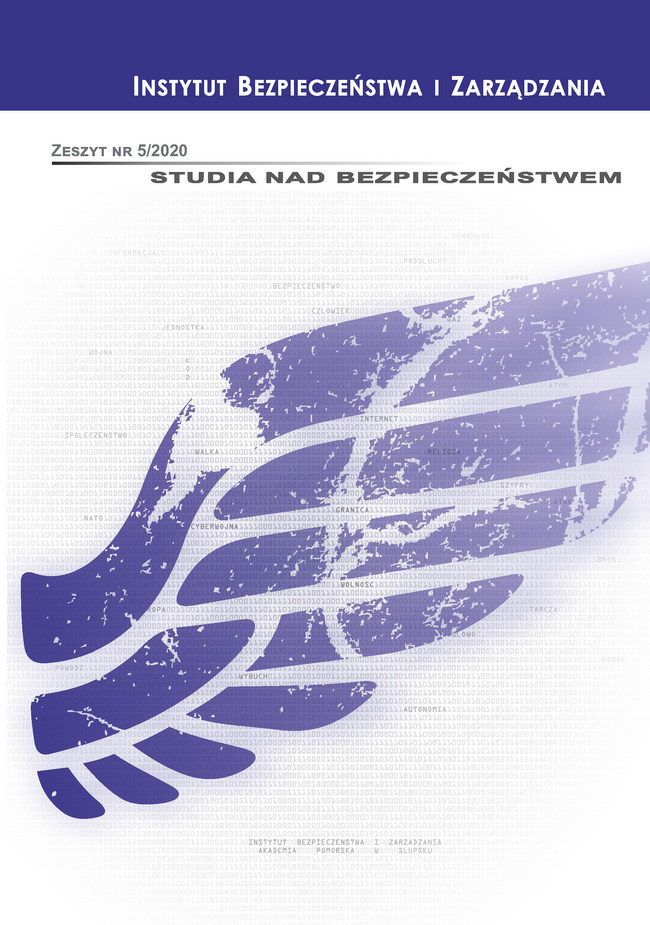No. 5 (2020)
From the Editor
Dear Readers,
Security problems have been and continue to be an inseparable part of human life, since they mainly concern man's being and ability to function in a certain environment or world. Whether security problems were perceived and defined or not, they determined the level of civilization development and are present today. Currently, an important sphere of human life is a relatively new space called virtual reality. This is the space of interaction created by the worldwide computer network that is the Internet. This artificially created reality, as an additional, extremely important area of human life today, in a way situates us between two worlds: the real and the virtual.
The article by J. Grubicka titled Virtual reality - a cultural oxymoron of the instrumentarium of freedom opening notebook No. 5 is an attempt to interpret the concept of freedom and its aspects and threats on the Internet. On the basis of currently observed phenomena, as well as current events, the dangers arising from the widespread availability of online publication of opinions are indicated.
Biological hazards and the category of threats that can cause negative consequences for the health and life of humans, animals or plants in the ongoing aids or covid pandemics in the world is taken up by A. Urbanek.
The issue of ecological security is also presented by M. Ziętarski in the article: Threats to ecological security - an attempt at systematization in the light of studied documents. In his article, the author describes the threats to ecological security that affect climate change and are a key trend in the area of security of the 21st century.
Issue five of the journal also includes topics in the field of international security in the broadest sense, including: the threats of migration, the structural cooperation of the European Union's CSDP, and the issue of NATO-EU relations. These issues are also addressed in the articles: G. Pietrek, "Threats of migration - the point of view of Poland and the European Union," A. Ciupinski, "Central European countries in the permanent structural cooperation of the European Union's CSDP," and A. Kalyayev, "European realities of collective defense: issues of NATO-EU relations."
The relevant elements of social threats from the point of view of the individual and the nation are described in the articles: K. Dubych, N. Serohina, "The informal labor and employment market in Ukraine - a threatening trend in national security," and N. Serohina, "Unemployment as a real threat to U.S. national security during the years of the Great Depression: a historical retrospective," and W. Walczak, "Corruption and the rule of law - a critical analysis."
- Winnicki, in the article "The formation of the model and role of the duty service in police institutions and its current importance in initiating police efforts to ensure internal security at the local level," pays attention to the perception of the position of the duty officer of the police organizational unit in field units. The author recognizes the increasingly momentous role of the function in the structures of units at the local level.
The article "Profit multipliers as a tool for managing the bottom line" by A. Kulikowska describes economic risks and management accounting tools for managing basic business risks. Profit multipliers, among other things, allow you to manage revenues and costs in an uncertain environment, offsetting the negative effects of its impact on efficiency.
Krzysztof Klimek, author of the article "(In)security and its educational implications," draws attention to the need to develop skills, attitudes and behaviors to respond in the face of situations that pose dangers to health and life, as well as to others. Knowledge of dangers and skills to act in the event of threats allow people to create safe living conditions for themselves (and others).
The Editorial Board would like to express its warmest thanks to all those who contributed to the next issue of Security Studies, and cordially invite readers to reach for issue five of our journal. We are confident that the topics we cover will arouse your interest and you will look forward to our next issue.
Editorial Board
